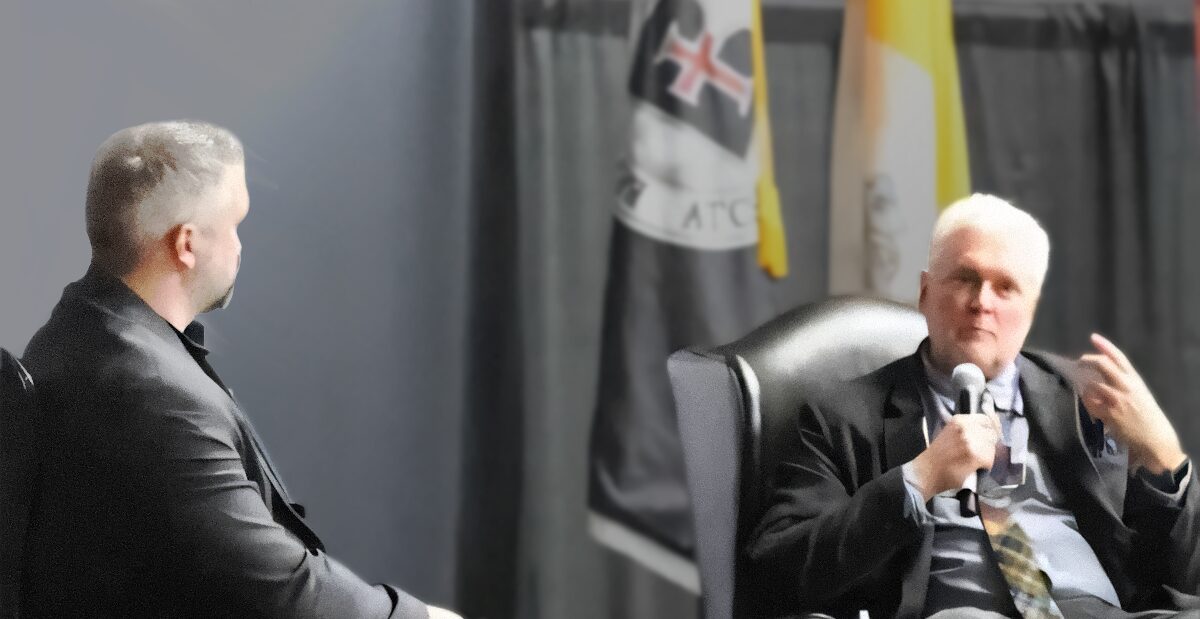The bad news is, marriage and childbearing are at historic lows.
But there is good news also: Those who choose marriage become better off financially, happier and report more fulfilled lives. If they have children and a religious faith, they are happier still.
That is what data show, according to the authors of the most important new books about marriage in America when they addressed the 14th annual Symposium on Transforming Culture in America on “Marriage and Family at the Peripheries.”
Next, the college plans to spotlight John Paul II’s teaching on marriage and family when George Weigel speaks on “The Genius of St. John Paul II on the Family” at at an event April 1 honoring Kansas City Archbishop Joseph Naumann.
“Benedictine College is gathering the best thinkers on marriage and family to try to find the best way forward for this crisis in our country,” said Benedictine College President Stephen D. Minnis.
At the Symposium, two keynote speakers were leading researchers: Brad Wilcox (above) is the author of Get Married and Tim Carney is the author of Family Unfriendly, books researching the reasons for the decline in marriage and childbearing in America.
Two additional keynotes are leading the way in finding solutions: Catherine Ruth Pakaluk is author of Hannah’s Children, which explores how mothers of large families are able to buck the trend and J.P. De Gance (right) is founder and president of Communio, which helps churches address the crisis in marriage and family.
They joined 56 other presenters and more than 200 participants at the Symposium.
“Each presenter had some ‘bad news’ about the state of marriage in America, but they also had ‘good news’ and solutions for treating the problems we face,” said Benedictine College theologian Matthew Muller, who directs the Symposium.
Leading Voices
Wilcox, Professor of Sociology and Director of the National Marriage Project at the University of Virginia, said “The path to a meaningful and happy life runs through marriage and the family … but too often, in the name of choice, the new elite view discounts values of marital permanence and sexual fidelity.”
Carney (right), a senior columnist at the Washington Examiner and a senior fellow at the American Enterprise Institute, took on the myths about the costs of raising children. “They think the only places to turn for help are the market and the state, and that babies are prohibitively expensive,” he said. “Often, people don’t even consider that extended family, neighbors, churches, can help support them as parents.”
Pakaluk (right), Associate Professor of Political Economic Thought at the Busch School at Catholic University of America, cited the 1990s Paula Cole hit song “Where Have All the Cowboys Gone?” to discuss how economies change. “Just as ‘car culture’ replaced ‘horse culture,’” she said, “‘sex culture’ replaced ‘marriage culture.’ But ‘sex culture’ is no culture.” She said only evangelization can change the landscape now.
J.P. De Gance agreed, citing generations of ineffective evangelization efforts. “Marriage is the most urgent ministry gap in the church today,” he said. “By nurturing strong marriages, churches can strengthen families and create a ripple effect of faith that impacts future generations.”
Family Life Leaders
Archbishop Joseph Naumann celebrated Mass at the Symposium and commented on the rich array of family life leaders at the conference. His record of service to the family will be celebrated at the April 1 event.
Leading intellectuals such as author Christopher Kaczor of Loyala Marymount University and moral theologian Pia de Solenni were featured presenters, along with leading practitioners in marriage-related ministry. Marcie Stokman, founder and president of the Well-Read Mom national book cluib spoke of her work with women; John Bishop, founder of the men’s ministry Forge discussed his work with men, and John and Claire Grabowski authors of One Body: A Program of Marriage Formation for the New Evangelization spoke about marriage preparation.
“This Symposium was very convicting that the Church’s teachings are real wisdom for modern man, even if modern man isn’t always receptive,” said Muller. “But the Church plays the long game, and as we continue to proclaim the Gospel in the world, there is hope for transformation of marriage and family life in our time.”
Finding Answers
Finding solutions was also the focus of the Business Summit, held in conjunction with the Symposium, by the Thompson Center at Benedictine College.
Director Dave Geenens said the summit described how the Summit sought ways to “strengthen families through virtuous business” and cited “ the foundational economic thinking offered by the keynote speaker, Dr. Paul Mueller, the ‘we want God’ economy from John Horvat III, Ed Van Buskirk’s extraordinary insights into the Ten Commandments as a moral code for business, and lastly, a panel of executive practitioners whose character and personal virtue have yielded extraordinary impact on employees and families.”
The weekend opened with an interview with Tory Baucum, director of the Center for Family Life at Benedictine College, by Jared Zimmerer, director of the Center for Catholic Media at the college. Baucum said the college’s plans to Transform Culture in America were directed at family renewal from the start.
President Minnis said, “St. John Paul II said the future of a nation passes by way of the family. It was exhilarating seeing the nation’s leaders in marriage and family on campus planning to do great things to help more people enjoy the benefits that come from loving marriages and stable households. The family has to be the center of any effort to Transform Culture in America.”
